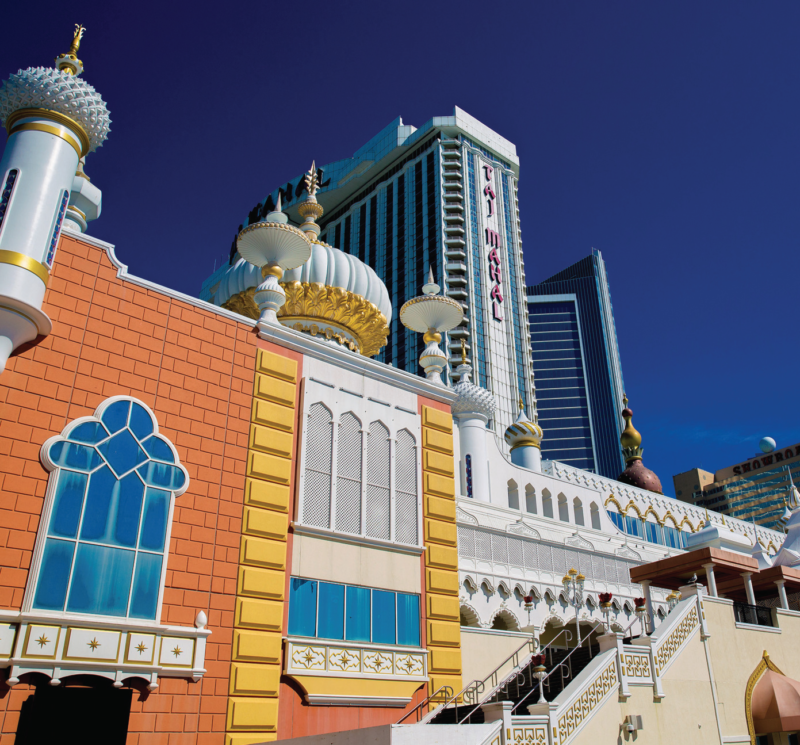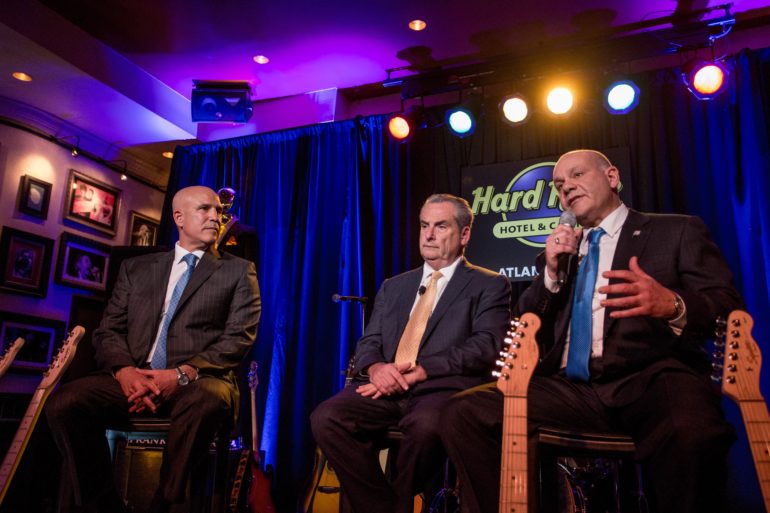From left: Joseph R. Jingoli Jr., Jim Allen and Jack Morris discuss plans for the new Hard Rock Hotel & Casino Atlantic City during an April 5 event at the property. — Courtesy: Hard Rock International
By Joshua Burd
Without question, Jack Morris is thankful for the casino owners that have kept their doors open in Atlantic City and continue to employ tens of thousands of people.
He even calls them partners in the effort to revitalize the embattled resort town.
Yet he sees one key difference between those operators and the team that is set to transform the former Trump Taj Mahal into the Hard Rock Hotel & Casino Atlantic City.
“They have shareholders and stockholders who care about making money and they have issues all over the world that they have to contend with — and then they can contend with what they have to contend with in Atlantic City,” Morris said. “We are true New Jerseyans. We truly have our heart and our dollars in Atlantic City and in what we do. That will continue.”
That connection to the state is as much about business as it is about sentimentality. Morris and Joe Jingoli, whose families have partnered with Hard Rock International to acquire the former Taj Mahal, bring decades of experience in New Jersey real estate and a level of hands-on, local expertise that an outside investor simply wouldn’t have.
Combined with the resources and the pedigree of a global brand like Hard Rock, Morris and Jingoli feel strongly that their plans for Atlantic City will be the catalyst that is often promised but not as frequently delivered. And they say it’s about more than simply reopening a casino: Already, they are thinking about prospects such as new local housing opportunities for employees, “where somebody can get up in the morning, spend their time exercising, being healthy, eating healthy, rather than … spending 45 minutes on the road each way.”
“Spend it taking care of yourself, where you can walk to work and you come in in the morning and your attitude is different,” said Morris, a prominent developer who is the CEO of Edgewood Properties. “This is what you see is being done throughout the country. We need to do more of that, in my opinion, in New Jersey.”
RELATED: Hard Rock unveils $375M renovation plans for Taj Mahal with Morris, Jingoli families
The partnership announced in March that they would acquire the shuttered Taj Mahal from investor Carl Icahn and redevelop it as a new Hard Rock resort and casino. With plans to open by next summer, they are now moving quickly on the roughly $500 million plan that includes removing all traces of its famed exterior and décor, along with gutting and rebuilding the interior of the former Donald Trump-owned property.
Morris and Jingoli offered an update on the project during a recent meeting with reporters, just a few weeks after an auction to sell off the items and furnishings found inside the hotel. Jingoli said the Taj was “a very, very well-thought-out” property, whose “original design (and) original bones lay out well for what we want to do.” That will entail some 2,000 rooms and potentially growing the Mark G. Etess Arena from 5,500 seats to almost 7,000, among other plans.
He noted, however, that the investors bought the building “where is, as is, close in 30 days.” So for a 4.5 million-square-foot property that is 35 years old, there is much to sort out.
“So there’s a combination of getting our hands around what needs to be done and working with Hard Rock and Jeffrey Beers, the architecture firm, to turn it into an iconic destination,” said Jingoli, CEO of Joseph Jingoli & Son, a Lawrenceville-based contractor and construction manager. “There’s a lot of work — nothing we’re afraid of, but it’s a lot of work.”

The hard work will be about more than just physical construction. Increased competition in the Northeast has caused Atlantic City gaming revenue to be cut in half from its 2006 peak of $5.2 billion. That led to the closure of five casinos in less than three years, including the Taj last fall.
Morris conceded that, when they “decided that we wanted to make a difference in Atlantic City, we knew we were taking on a large challenge. So … you can’t go into something this big and this complex without expecting there to be a lot of hurdles.”
But he believes the resulting venue will thrive, in large part because of the demand for entertainment and the experiences that Atlantic City can offer.
“Across the globe, people have responded in some fashion or way in a positive manner to Hard Rock and to what we’re doing in Atlantic City,” Morris said. “And we were really surprised at the amount of people that have come to us wanting to be part of the success of the Hard Rock Atlantic City.”
He said he was unable to disclose the names of any potential operators or offerings for the time being, but said “they’re game-changers.”
“The entertainment, the experience are going to bring people there,” Morris said. “Being able to go to the beaches, being able to go to the Boardwalk, being able to go to do the things that people really want to do and love to do in New Jersey — that makes New Jersey the great state it is — hasn’t really been used or had in Atlantic City for a long time. … So we can bring that back.”
Not to mention that both Morris and Jingoli have a track record of taking on difficult projects that help to spark the surrounding area. In Somerville, Edgewood built the borough’s first luxury apartments as part of a redevelopment of a run-down shopping center on West Main Street. The new mixed-use town center includes not only a 70,000-square-foot ShopRite, a Starbucks and other retailers, but also the first New Jersey location for the international Wolfgang’s Steakhouse chain.
Edgewood’s 108-unit upscale apartment building opened in 2014 and is fully leased, Morris said, and Somerville now has a half-dozen other mixed-use projects in its development pipeline.
“People that have never been to Somerville are now coming to Somerville,” said Morris, who spoke during a recent interview at Wolfgang’s. “You look at some of the people here. These are people that would not normally come to Somerville.
“The same thing is going to happen in Atlantic City.” The partners also know that it takes more than one high-profile project to help a community. Jingoli said he doesn’t believe that Atlantic City residents feel a connection to the major industries in the city, but “we’re taking some big steps to try to change that on our watch.”
For instance, in March, Joseph Jingoli & Son launched a training course at the Boys and Girls Club of Atlantic City, where students were mentored by professionals in the construction, utilities and casino industries and offered additional assistance toward education or job placement. The firm, which is the construction manager for the mixed-use Gateway development in the city, has also sponsored training for residents that led to jobs on the project.
“I think we’re going to make a statement and a change that says that the community and the city will be included in our project like hasn’t been done before,” said Jingoli, who spent a decade living in the city and whose firm oversees similar programs in Newark and Camden.
He added that “this is not altruistic, this is not charity — this is smart business: Hire the people that live in the community that your company is in.”
“You get all the benefits of the relationships that they and their families in their communities all have there,” Jingoli said. “They have buy-in to your company and your project.”
Morris also said workforce housing will be essential to the larger goal of revitalizing Atlantic City. Whether Edgewood is the one to build it remains to be seen, but he said he is committed to the idea in the city and statewide.
“It’s a passion of mine, and I truly believe that part of turning Atlantic City around will be affordable housing where people can work, where people can play, where people can enjoy their lives and start turning the place around,” he said. “And that will happen. I promise you that will happen.
“How long will it take? That’s going to be the interesting part, and I’m really excited to see how the response is and how we can get that next step off the ground.”
In conjunction with their own experience, Morris and Jingoli seemingly have no doubt that Hard Rock is the right operator for the job.
The company announced in July that veteran gaming executive and New Jersey native Matt Harkness would serve as president of the new casino, bringing experience that includes 15 years with Trump Casino Resorts in Atlantic City.
That’s not to mention that Hard Rock International Chairman Jim Allen is an Atlantic County native and that many of the new hires for the property already have ties to the Garden State.
“They’re standup, great partners,” Morris said. “(With) the Seminole tribe and Jim Allen, New Jersey couldn’t ask for better partners, for better operators and for somebody to turn around Atlantic City.
“And we’re just happy we have the opportunity to be able to do it.”
The winning formula
Aside from a physical transformation of the Trump Taj Mahal, Jack Morris believes creating a new entertainment venue will be critical toward reopening it as the Hard Rock Hotel & Casino Atlantic City.
He sees no better way to do that than by expanding the Mark G. Etess Arena and tapping into the vast network that Hard Rock leverages across its 230 properties worldwide.
“It’s truly one of the best arenas in the country, but we’ll only make it better with Hard Rock’s size and with their opportunities in the entertainment business,” Morris said. “That will be something that sets us truly apart from anybody else. And it gives you the opportunity to bring in better performers, so that’s something that we want to work on.”
Fellow investor Joe Jingoli sees group meetings and conventions as another driver of the planned Hard Rock Atlantic City. The operators are already getting inquiries from those looking to book at the property, and they point to the growth of the meeting business elsewhere in the city, especially in new venues such as the Harrah’s Waterfront Conference Center.
Last year, Atlantic City set a new record with 260 meetings and conventions booked, representing nearly 290,000 future room nights committed to groups, according to the city’s convention and visitors bureau.
“We have a lot of convention space and great spaces for it,” Jingoli said. “That’s where you drive your midweek business.”










